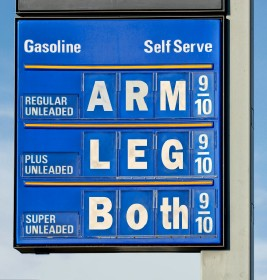 If you put gas in your car lately, you know about skyrocketing gas prices. In the past two weeks, gas prices nationwide rose nearly 20 cents according to the U.S. Energy Information Administration.
If you put gas in your car lately, you know about skyrocketing gas prices. In the past two weeks, gas prices nationwide rose nearly 20 cents according to the U.S. Energy Information Administration.
It’s worse in California, where gas prices spiked by more than 45 cents in two weeks, and more than 25 cents in the past week alone. The average price for all grades of gasoline in California has been pushed to $4.338 a gallon (week ending 2/27/12). Prices in California are expected to exceed all-time highs.
As employees face rising gas costs, employers may be hit with questions regarding reimbursement of business mileage expenses. Last summer, the IRS gave a mid-year increase to the mileage reimbursement rate — to 55.5 cents per mile from 51 cents per mile — because of rising gas prices. The IRS has not changed this rate in 2012, and 55.5 cents per mile remains the effective rate.
Under California Labor Code section 2802, employers must fully reimburse employees for all expenses actually and necessarily incurred. Many employers typically choose to use the IRS mileage reimbursement rate, but its use is optional. The Division of Labor Standards Enforcement has opined that the use of the IRS mileage rate will generally satisfy an employer’s obligation to reimburse for business related vehicle expenses, absent evidence to the contrary.
However, if an employee can show that the chosen mileage reimbursement rate, even the IRS rate, does not cover all actual expenses the employee has incurred, the employer must pay the difference. Business vehicle expenses do not include only gasoline, but also wear and tear (depreciation), repairs, oil, insurance and other costs.
Generally, the IRS rate will cover such expenses. But California employers should make certain those expenses are covered, especially if the employee drives a gas guzzler:
- Employee drives his/her older model truck for work. The truck gets only 10 miles per gallon. Gas is $4.50 per gallon. The employee drives 100 miles, using 10 gallons of gas, and his gas expenses total $45. The IRS mileage reimbursement is 55.5 cents per mile.
- Does the $10.50 left over after paying gas expenses cover the employee’s other actual costs? This is the question employers should make sure they answer.
Employers should review their policies to make certain that they are providing a rate of reimbursement that takes into account the necessary and reasonable costs employees will incur, including the rising cost to fill up at the pump.
Be cautious if tempted to alter the rate of reimbursement based on the type of vehicle the employee drives and the costs associated with that particular vehicle.
Author: Gail Cecchettini Whaley
HR Watchdog, HRCalifornia’s Employment Law Blog, © California Chamber of Commerce

















